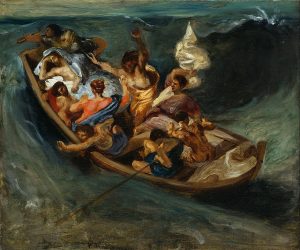Thoughts on Sunday’s Lessons for June 20, 2021
First Reading (Track One): 1 Samuel 17: (1a, 4-11, 19-23), 32-49 or 1 Samuel 17:57-18:5, 10-16
We hear more about young King David in Sunday’s Track One first reading, but the lectionary offers worship planners a choice between two readings.

Christ sur la mer de Galilée (1841), oil painting on canvas by Eugène Delacroix (1798-1863). The Nelson-Atkins Museum of Art , Kansas City, Mo. (Click image to enlarge.)
The first option retells the familiar story of the battle between David and the Philistine giant Goliath. A less familiar story constitutes the alternative choice, which tells about an ominous encounter between King Saul and David after Goliath was slain. Together the narratives portray David rising to become King, against jealous Saul’s desire to kill him before he can assume the crown. We will continue following Saul, David and Solomon through August, whereupon our Track One first readings turn to an anthology of the Hebrew Bible’s wisdom literature including Proverbs, Job, Esther and Ruth.
First Reading (Track Two): Job 38:1-7,34-41
Even in times of chaos and fear, God remains with us: This theme informs this week’s Track Two readings. We are all surely familiar with the trials of Job, who was tested by God at the urging of the adversary. Job retained his faith in spite of horrifying tests that would break even the strongest. In this reading, nearing the end of the book, Job finally gets his wish that God come out of hiding and listen to him. But God, speaking out of a whirlwind with power and might, sets Job in his place with words like thunderbolts: “Where were you when I laid the foundation of the earth? Tell me, if you have understanding.” Job quickly repents; and at the end his fortunes are restored.
Psalm (Track One): Psalm 9:9-20 or Psalm 133
This passage from Psalm 9 is paired with the David and Goliath reading. Befitting the first reading’s warlike setting, the Psalm gives thanks to God who protects the people in time of trouble and oppression; who never forsakes those who seek protection in God’s name. Psalm 133, which we also read recently on the second Sunday after Easter, is to accompany the first reading about David and Saul. It celebrates the goodness and pleasure of living in unity, comparing this with the luxury of anointing with fine oil so abundantly that it runs down one’s hair and beard.
Psalm (Track Two): Psalm 107:1-3, 23-32
This beautiful hymn of praise to a God of mercy who protects us in peril sets a pitch-perfect tone for the following Gospel story about Jesus stilling the storm. The psalmist recalls a time when a violent storm at sea came upon some travelers whom God had redeemed. When they cried out to God, the storm gave way to calm. The travelers arrived safely on the shore, and we are called to join them in thanks and praise to a loving God who protects us from peril and delivers us from distress.
Second Reading: 2 Corinthians 6:1-13
The theme of this letter, which we will continue reading through early July, rests on Paul’s effort to reconcile and restore good relations after a period of trouble and anger among the Christian community in Corinth. Paul himself has suffered many things for following in Jesus’ way, he reminds them. He was subject to beatings and imprisonment, hunger and sleeplessness, riots and more. Although Paul doesn’t mention storm and shipwreck here, we know that he endured those trials, too. In spite of all difficulties, he urges, remember that God is with us. Open wide our hearts and accept God’s love.
Gospel: Mark 4:35-41
Huge crowds have been following Jesus in the Jewish territory along the western shore of the Sea of Galilee. Now he takes the apostles on a boat across the broad lake to Gentile country on the other side. Midway in the lake’s deep waters – the Gospel actually calls it a “sea” – we hear one of the beloved Gospel stories that many of us remember, when Jesus wakes from a peaceful slumber to quiet the wind and waves and save the ship. As children, though, we probably didn’t focus on the apostles’ reactions: First they fear that Jesus doesn’t know – or even doesn’t care – that they are in deadly danger, scared out of their wits. Then, catching their breath when all is calm again, they seem shocked to discover that Jesus actually has the power that they had just called on him to use.
